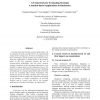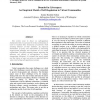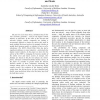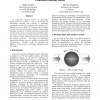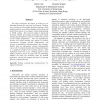HICSS
2005
IEEE
15 years 7 months ago
2005
IEEE
Location-based and location-oriented applications will be amongst the most powerful drivers of organizational change in the coming years. However, the strategic use of these techn...
100
Voted
HICSS
2005
IEEE
15 years 7 months ago
2005
IEEE
This article aims to focus on self-regulation mechanisms that are exercised by virtual communities in order to maintain their boundaries of autonomy while directing behavior of th...
91
Voted
HICSS
2005
IEEE
15 years 7 months ago
2005
IEEE
The past two years have been a turbulent time for the New Economy generally – and for the digital content industry in particular. In the wake of the dot.com and telecoms crashes...
HICSS
2005
IEEE
15 years 7 months ago
2005
IEEE
An Integrative Mental Model of Knowledge Management can provide a way of visualizing the interrelated elements that comprise a knowledge management system. This original model, bu...
122
Voted
HICSS
2005
IEEE
15 years 7 months ago
2005
IEEE
This paper considers the elements and challenges of heterogeneous data management and interdisciplinary collaboration, drawing from the literatures on participatory design, comput...
119
Voted
HICSS
2005
IEEE
15 years 7 months ago
2005
IEEE
Informal conversations occur all day long among employees. These conversations allow employees to share experience such as innovative ideas for performing a task. Internalizing th...
118
click to vote
HICSS
2005
IEEE
15 years 7 months ago
2005
IEEE
The study investigates the impact of weblog use on individual learning in a university environment. Weblogs are a relatively new knowledge sharing technology, which enables people...
133
click to vote
HICSS
2005
IEEE
15 years 7 months ago
2005
IEEE
The ability for software products to adapt to future changes is essential. Whether the change, the delta, is prefixed to subclasses or postfixed to super classes, class hierarchie...
115
Voted
HICSS
2005
IEEE
15 years 7 months ago
2005
IEEE
In the past decade outsourcing a software system’s support and maintenance has become relatively common across most organizations. In this paper we consider a few issues governi...
113
Voted
HICSS
2005
IEEE
15 years 7 months ago
2005
IEEE
This paper explores the possibility of extending the functional genre analysis model to account for the genre characteristics of non-linear, multi-modal, webmediated documents. Th...
